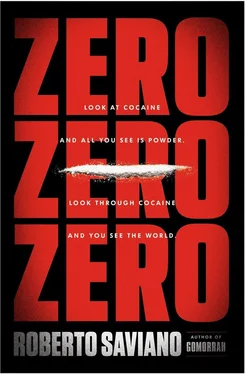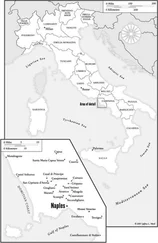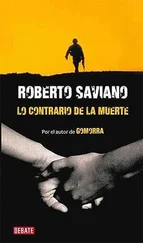• • •
“Death is always after you,” Sergej, one of Mogilevic’s closest associates, loves to say. Sergej is an insignificant little man in rumpled clothes, and therefore very good at making himself invisible. Don Semën despises him but finds him useful: To be untouchable you can’t be vulnerable to threats. And Sergej isn’t. Everyone in Moscow knows he always carries a briefcase around with him. But only a few know what’s inside. Mogilevic never talks about it, not even with his wife. Once Sergej was kidnapped by one of Mogilevic’s rivals, a builder in the running for a public works contract from the city of Moscow. Sergej didn’t put up any resistance; he let himself be dragged into the dark basement of some anonymous high-rise on the outskirts of Moscow: no pleas; no prayers to be let go; no hint of retaliation from his powerful boss. He simply opened his briefcase, and the next day — still in his threadbare suit, looking dazed and indifferent — he knocked at Mogilevic’s door. “How did you do it?” his boss asked, actually glancing up from his laptop for once. Sergej went over to the desk and set his briefcase on it. Click, click, and with a swift move of the wrist he turned it 180 degrees. Mogilevic didn’t bat an eye when he saw himself with Sergej on one of his rare vacations at the Black Sea. He hadn’t remembered that Sergej had snapped that seemingly innocuous beach scene, which guarantees him that no one will dare touch a hair on his head. He smiled, closed the briefcase, and turned it another 180 degrees.
Perhaps it was Sergej’s kidnapping, or the dangers of Moscow, now gripped by fear of gang warfare, that make Mogilevic think it might be better to get out of town. Money’s not a problem; he’s already accumulated several million dollars, which he’s made in large part thanks to his most dangerous weapon: his acumen for financial affairs. As soon as perestroika opened the doors to private enterprise he quickly set up several companies, officially for fuel import-export, and registered far from the spires of Red Square, on one of the offshore islands in the English Channel. One company is called Arigon Ltd., the other, Arbat International, of which Mogilevic controls half the stock, the other half being divided between the Little Jap and the Solncevo bosses, Michajlov and Averin. With such good friendships now signed in ink, all Mogilevic has to do is pack his bags. In 1990 he decides to move to Israel, along with his most trusted men. They’re the vanguard of the second wave of Soviet Jewish immigration, which is also the second wave of mafia importation, following that of the 1970s, which Mogilevic was so deft at exploiting. It wasn’t only innocent victims of discrimination who emigrated but thousands of criminals whom the KGB was thrilled to be rid of. Many of them landed in the United States, colonizing Little Odessa, where Ivan’kov would settle in 1992; others ended up in different parts of the world. But they stayed on good terms, as part of a global network in which Don Semën and the Little Jap merely had to insert themselves, without ever losing touch with the Russian brotherhoods.
Mogilevic becomes an Israeli citizen and establishes ties with emerging Russian and Israeli groups who sense his talent for managing the complex workings of international finance. His empire expands, thanks to the money he makes from illegal activities — drugs, arms, prostitution. But it also grows through his reinvesting dirty money in legal enterprises, such as discothèques, art galleries, factories, and all sorts of businesses, including an international kosher catering service. According to an FBI document, he owns an Israeli bank with branches in Tel Aviv, Moscow, and Cyprus, which recycles money for Colombian and Russian criminal groups.
Yet the Promised Land is a tight fit for Don Semën: After one year there he marries a Hungarian woman, Katalin Papp, thus adding a Hungarian passport to his Ukrainian, Russian, and Israeli ones, and moves to Budapest. Officially he works as a wheat and grain dealer, but in reality he sets up a criminal organization that bears his name, with about 250 members and a hierarchical structure modeled on Italian mafias, to the point that many members are relatives of his. Budapest turns out to be a safe haven, and with the protection of corrupt politicians and policemen, his affairs prosper without too much interference. Mogilevic knows that tranquillity has a price, a price that money can’t always pay.
In 1995 two colonels from the Russian Presidential Security Service pay him an undercover visit in Hungary, where, out of prudence, only one of Mogilevic’s Israeli associates furnishes them with what they’ve come looking for: classified information to use in the Russian electoral campaign. The FBI’s words are more eloquent than any image: “‘He also ingratiates himself with the police by providing information on other groups’ activities, thus appearing to be a cooperative good citizen.”
Don Semën has a few other tricks to help keep problems away; He never takes part in his group’s day-to-day operations, never gets his own hands dirty, thereby making the work of the forces of order and justice trying to nail him extremely difficult. What’s more, he pays Hungarian ex-cops to keep him informed of any police investigations involving him. Thanks to his managerial skills, his financial savvy, and his extremely talented staff, who are experts in cutting-edge computer technology, Mogilevic becomes one of the world’s most powerful bosses. He creates his own private army, largely composed of specnaz and Afghan war veterans, who are famous for their brutality. To cover his prostitution business, he uses a chain of nightclubs, the Black and White Clubs, which he operates in partnership with Solncevskaja and Uralmaševskaja, another Russian crime group. In 1992 Mogilevic organizes a strategic meeting with the leading Russian prostitution bosses at Budapest’s Atrium Hotel. He makes them a proposal: Invest $4 million of prostitution profits to open more Black and White Clubs in Eastern Europe. Don Semën recruits young women from the former Soviet Union, gets them legitimate cover jobs, and puts them to work in the new clubs. He even hires bodyguards to protect them. Business thrives: The girls are beautiful and make tons of money. During the same period Mogilevic contacts some Latin American organizations: His girls are perfect for drug dealing. They’re the ones who caress rich gentlemen from East and West, who undress them and give them pleasure. And Don Semën, whom the girls call Pàpa, really does feel like a father. From his viewpoint prostitution is a kind of welfare: His girls don’t fall into the hands of drunken brutes, and some of them even manage to put something aside for the future.
But Pàpa has to get angry sometimes. There’s another Russian, Nikolaj Širokov, who’s trying to move in on the Budapest prostitution racket, and who goes about the city protected by his goons. He has a weakness, though. Women aren’t merely a business for him; he can never get enough of them. Our brainy Don needs to find a woman with real class, irresistibly gorgeous, wave her under Širokov’s nose like a jewel too precious to pass off to clients, and then wait for the right moment. At the end of 1993 Mogilevic strikes. Širokov is eliminated in Budapest, along with two of his bodyguards. End of competition in the capital city on the Danube.
Mogilevic doesn’t enjoy using such brutal means, however, and is always quite happy to leave the job to one of the groups he’s associated with. The Brainy Don prefers to speculate. As soon as the Berlin Wall shows signs of crumbling, he starts changing rubles into hard currency, into German marks.
In 1994 Mogilevic manages to infiltrate Inkombank, a Russian banking colossus with a network of accounts in the biggest banks in the world (Bank of New York, Bank of China, UBS, and Deutsche Bank), and to take control of it: This allows him to have direct access to the world financial system and to recycle proceeds from his illegal businesses easily. In 1998 Inkombank is dismantled for improper conduct on the part of its directors, violation of banking laws, and failure to honor its obligations toward its creditors. His business is booming, and Mogilevic becomes the object of several worldwide investigations, from Russia to Canada. But the vor recycles his identity just as he does his money: Seva Moguilevich, Semon Yudkovich Palagnyuk, Semen Yukovich Telesh, Simeon Mogilevitch, Semjon Mogilevcs, Shimon Makelwitsh, Shimon Makhelwitsch, Sergei Yurevich Schnaider, or simply “Don Seva.” A ghost with the gift of ubiquity and a sense of irony.
Читать дальше












